Two men each brought their own righteousness to God’s temple and presented them to God—the publican and the Pharisee.
The Pharisee presented his righteousness: he strictly fulfilled everything prescribed in the law of Moses—not just fulfilled, but fulfilled it devoutly, to the last detail. And in this he sees the meaning of his life. He studies the law. He disdains everything that is not in accordance with this law. And this is truly his own suffered and soul-saving—or so he thinks—righteousness. But in the Church we call this righteousness the righteousness of the Pharisee—prideful, and false. It is a mortally dangerous righteousness. It seeks and very successfully finds strength in self-aggrandizement, and the continual humiliation of others. And this strength really is quite remarkable. But the God of Truth and Love loathingly rejected this deceitful and cruel spirit: Ye serpents, ye generation of vipers, how can ye escape the damnation of hell? (Mt. 23:33). There are no more wrathful words in the Gospel uttered by the Creator to His creation. Only the “righteous” Pharisees earned them.
The publican also brought his own righteousness to God. This righteousness consisted in words that, like those of the Pharisee’s, expressed the spirit and state of the man’s soul. But these words became the deepest and most beloved prayer of all disciples of the Lord Jesus Christ. We repeat them every day: “God, be merciful to me, a sinner!” This sincere and bitter, wise and saving truth about himself became the publican’s sacred offering to God.
What righteousness do we bear in our own souls? What righteousness do we not in words but in realty offer from our hearts to God, Who knows the most hidden things about us? The Holy Church from year to year calls us to learn from the publican’s example.
Today we have also run across two kinds of righteousness that people bring to church with respect to one and the same recent matter. Ten days ago an event occurred that has stunned and troubled millions of people: His Holiness Patriarch Kirill met with the Pope of Rome. However, this event also caused a large number of Orthodox people serious confusion—let’s call a spade a spade. We priests know this from confessions and questions that have been asked us at meetings and in letters to the website, Pravoslavie.ru. What is there to do? This is nothing other than a test—a test of the sobriety of our faith, our faith in the Church, holy Orthodoxy, and the Gospels of Christ. Today, brothers and sisters, we have to talk about this.
We are not going to talk about what Catholicism is—that is a scholastic subject. Each of us can take a look at the catechesis, study the many writings, including patristic writings, that talk about the deviations and heresies present in the Catholic faith.
The holy fathers definitely consider Catholicism erroneous and heretical. “Papism is what the heresy that has possessed the West is called, and from it as branches from a tree have come the various Protestant teachings,” St. Ignatius (Brianchaninov) points out. “The Pope changed many dogmas, corrupted all the sacraments, weakened the rules of ecclesiastical leadership and correction of morals, and everything from there went not according to God’s intention—worse and worse…” writes St. Theophan the Recluse.
Other holy fathers are in agreement with them.
The vast Christian catechism of the Orthodox Catholic Eastern Church determines the meaning of heresy: “Heresy is when people mix opinion into the teachings of the faith that are against Divine truth.”
But at this we must also recognize as essentially important for all our patristic tradition: The falling away of the Western Church in 1054 was one of the most terrible tragedies in the history of Christianity. This is our catastrophe and woe. And therefore the desire for unity, the prayer for it (That they all may be one [Jn. 17:21]), commanded by the Lord Jesus Christ Himself, is perfectly natural for Orthodox Christians.
Here are the words of St. John of Kronstadt, a severe critic of Latinism: “Who of the Orthodox would not wish to unite with Catholics or Lutherans and be one with them in Christ, one Church, one society of believers? But which of the members of these so-called Churches, especially of their primates, called popes, patriarchs, metropolitans, archbishops and bishops, or priests and fathers would agree to renounce their errors? None. And we cannot agree with their heretical teachings without injury to our own soul’s salvation… Can we unite what cannot be united—a lie with the truth?”
And here is what holy Hieromartyr Hilarion (Troitsky) wrote to an Anglican correspondent: “What conscious Christian does not sorrow in soul when he sees the enmity and division among people who should be uniting their faith, among whom should be reigning the peace left and given by Christ to His disciples, and love poured into the hearts of Christians by the Holy Spirit! Over the centuries of separation there has been so much already said in enmity and denunciation against each other that it is high time for us to talk in the spirit of love and good will. I am entirely ready to repeat the words of your letter: “The spirit of love should triumph over the spirit of hate; the spirit of humility over the spirit of rebellion and pride.”
We should take two important lessons from these epistles by our saints. The first is: ecclesiastical and liturgical unity can only happen on the basis of return to the original unity, to the teaching of the truth of the One Holy Catholic and Apostolic Church, as St. John of Kronstadt tells us. The second is from Hieromartyr Hilarion: “The spirit of love should triumph over the spirit of hate.”
But what do we often see today with respect to this still bleeding wound of a problem? Here is one letter of the many we have received in recent days:
There can be no association with Catholics. What can wolves and sheep have in common? How can betrayers of the truth of Christ be our brothers? The meeting of the Patriarch with the pope is a direct apostasy from patristic commandments and synodal encyclicals.”
I will not cite other more severe examples, but there were many. Do you feel the difference between this and the sorrow over lost unity felt by St. John of Kronstadt and Hieromartyr Hilarion? The latter of these was moreover extraordinarily tough on Catholic teaching, and didn’t even consider Catholics to be Christians inasmuch as they are outside the Orthodox Church.
Where is such ruthlessness coming from today? Ah, from zeal for saving Orthodoxy? From the desire to uproot all evil in the Church? How can we not recall here St. Joseph of Optina, who said, “The zeal that desires to uproot all evil is itself in fact the most terrible evil.”
But the devil’s work goes even further. Here is what an Orthodox Christian by the name of Joseph wrote on our website on February 20:
I hereby announce that I am breaking prayerful and Eucharistic communion with all hierarchs who approved and signed at the Council of Bishops on February 2-3, 2016 the draft document of the Pan-Orthodox Council, accepted at the fifth Pan-Orthodox pre-council meeting in Shambesy on October 10-17, 2015, until they bring forth written and public repentance. Because this document violates the Creed, and contains heresy condemned by the Church Councils and holy fathers of the Church. The Patriarch has for all to hear recognized the heretics as a Church, the pope as “His Holiness”, and allowed heretics to be present at the Liturgy of the faithful. The bishops of the Russian Orthodox Church are silent, and some even praise the document and the meeting of the Primate with a heretic. Lord, have mercy! I have hated the church of the deceitful, and will not sit down with the impious. Amen.
What devilish outrage, what a demonic mockery! A man who frenziedly expresses his concern for the Church casts himself out of and excommunicates himself from the Church of Christ. And the wretch is not even conscious of what he is doing with himself. After all, by thy words thou shalt be justified, and by thy words thou shalt be condemned (Mt. 12:37). This is what a layman has done with himself. But when you hear about the voluntary falling away from the Church by priests…
This is truly frightening. This is what unreasonableness does, this is what demonic haste does, this is what the spirit of deceitfulness, condemnation, and self-aggrandizement does, which, like that of the Pharisees, with an appearance of salvation, destroys the abode of the Divine Spirit in and around itself, drawing others into ruin by word and example.
We pray many times at every service for His Holiness Patriarch Kirill as for our Great Master and father. We pray that the Lord would bless him to “rightly divide” the word of Gospel truth. And those who have prayed just like this with the whole Church but now condemn the Patriarch—what can they essentially be pushing other than their own suppositions, suspicions, and endless condemnation? That the Patriarch accepted the Filioque? That he has confessed dogmas that we call heretical? That he has gone under submission to the Pope? Nothing of the sort or even close to this has happened.
Yes, the Patriarch has met with the Pope at a time when he considered it necessary, whether we like this or not. The holy apostle writes, Obey them that have the rule over you, and submit yourselves: for they watch for your souls, as they that must give account, that they may do it with joy, and not with grief: for that is unprofitable for you (Heb. 13:17). It is appropriate to recall also the warning by St. Gregory the Theologian, “Sheep, do not shepherd your shepherds and do not overstep your bounds; it is well enough for you if you are in a good pasture. Do not judge the judge, do not write laws for the legislators.”
The Patriarch explained the goal of this meeting. Here are his words from a recent sermon in Latin America: Having said that dogmatic differences remain between us, His Holiness talked about the aim of his communication with the chief priest of Rome—the necessity to “struggle for the cessation of persecutions, the repression of Christian values, and so that the de-Christianization of twenty-first century human civilization would not happen.” The Patriarch recalled that today in the Middle East and Africa millions of Christians are subjected to the cruelest persecutions; churches and monasteries are being razed, whole villages and towns of the faithful are being destroyed, and “the fear of a great war is touching mankind.”
Can two such important religious leaders raise their voices and draw attention to the murder of Christians and persecutions against them? They can. We recall that during the persecutions in Russia both the Archbishop of Canterbury and the Pope of Rome repeatedly called upon world society to apply all efforts to stop the godless. And without a doubt, that the Orthodox Church in Russia during the 1920s and 30s was not completely destroyed is due to the pleas of our heterodox brothers. For over twenty years, they, mainly the Anglicans, constantly and with full voices reminded the world of the persecutions against Christians in Russia. This was their tireless labor of many years; and as we see now, it was a labor along the lines of God’s Providence to save our Church: During the period of international recognition of the USSR, however much the Bolsheviks wanted to completely destroy the Orthodox Church, in the face of all-world Christian society they did not resolve to do so.
About what other goals for this visit did the Patriarch speak? He explains that together we need to stand up against the persecution of Christians in today’s Europe, “Where evil political powers under the guise of tolerance are forcing Christianity out of societal life, when people are forbidden to wear in public places and especially at work the crosses placed upon them at their baptism, when in certain countries it is forbidden to use the word “Christmas”, and it is replaced with some unintelligible word or simply, “winter holiday”, when laws are passed that justify human sin, and there is a refusal to understand marriage as the sacred bond between a man and a woman, when mankind is still suffering from a huge number of abortions, killing children, and there is an increasing number of divorces.”
What is putting itself in opposition to these words of the Primate of the Russian Church? Panicky suppositions and speculation based on outright fantasies, self-proclaimed prophesies about how terrible it will all be, that they are about to betray Orthodoxy, and so on, and so on? But the worst thing for those taking this stance is not even the fear mongering but their essentially total unbelief in the Church. And it must be said that this enchanting, self-forgetting unbelief with which they have no intention of parting, and they rush vying with each other to share it with others. They do not believe that even if—God forbid—apostasy from Orthodoxy arises in the bowels of the Church, the Church will not be able to overcome it. No, they say to us, the gates of hell are just about to prevail against it. But similar things were also heard in the Church during the persecutions of the twentieth century, and at the advent of the ecumenical movement, and during relatively recent times of confusion. Do not be afraid, brothers and sisters, the ship of the Church, guided by our Lord Jesus Christ with His Divine Rudder, has for two thousand years overcome storms like these and will again overcome them.
We will pray that the attempt by His Holiness to “speak with the heterodox in a spirit of love and good will,” in the words of holy Hieromartyr Hilarion, might be successful. Beyond that—let God be the judge. Will this last of many attempts be crowned with success? Many times have Orthodox with all their heart and soul gone to meet the Catholics halfway, and even simple Catholics have had the same feelings, but it always ended in the same perplexity and division. But does this mean that we should stop trying? Definitely not.
Of course, we mustn’t forget that in our common history there have been very dark pages—when the Catholic bishops and priests came to our land not with words of kindness and friendship but with the sword. The crusades of the eighth century; the Time of Troubles, when besides political subjugation of our country the main aim of Catholic expansion was the abolition of Orthodoxy. Fr. John (Krestiankin) wrote in recent times, in the 1990s, when the Ukrainian Uniates were seizing churches, attacking and even killing Orthodox Christians, “And if we look deep into history and at the deeds of the newly-appeared “saviors” of Russia—the Roman Catholic Church—then we see that it took place every time some “time of troubles” was occurring, there was always only one aim—to subject Rus’ to Roman domination.” With all our sincere goodwill we of course must never forget that this is our history.
St. Theophan the Recluse, when specifying the nature of Catholicism, wrote, “The Latin Church is of apostolic origin, but it fell away from apostolic tradition and was thus damaged. Its main sin is its passion for forging new dogmas…” We know these new dogmas; the Catholics introduced them one after the other, and we simply could not agree with them. We understood that this was false, and sorrowed over our brothers. His Holiness rightly calls them in a Christian manner “brothers”, but brothers who have strayed far away from us. However, the Patriarch places blame even on these “brothers”. “You will never be brothers to us!” is somehow a little too familiar to us today.[1] And we well understand what sort of spirit this is.
This is against the teachings of Christ. The Lord went after the lost sheep and found it. Don’t we know about that? But how wisely we must act in order not to humiliate or insult, but to show the fullness and beauty of Orthodoxy, all its strength and joy, everything from which the Western Church has fallen away. How many hundreds of thousands of Catholics, even whole communities, have converted to Orthodoxy in recent years! Some have become priests and monks, and others have become pious laypeople. But what if we said to them, as some are suggesting we say, “God, I thank Thee that these people are not our brothers and never will be”?
Almost 1000 years ago the Western Church fell away, and just look at what tragedies spiritual cataclysms, and fights have raged as the consequence of this event, even to the present day! That is how terrible is the sin of division in the Church; and God forbid we should ever be partakers of it. Even within Orthodoxy disagreements are not ceasing. Look, in our church there is an icon on which is depicted two great holy hierarchs of the nineteenth century: St. Ignatius (Brianchaninov) and St. Theophan the Recluse, our beloved teachers. But one of them, St. Ignatius, did not recognize the Catholics as a Church, while St. Theophan judged differently: “Our Church has condescension toward Catholics and accepts not only Catholic baptism and other sacraments, but even the priesthood, which is very significant. Only we must hold to one thing—that we must not convert to Catholicism, for they have certain parts in their form of confessing ecclesiastical rites that have been corrupted and changed since their departure from the ancient form. I can’t say anything more than this.”
Our St. Hilarion (Troitsky) said firmly, “For me, Catholics are not a Church, and therefore not Christians, for there is no Christianity without the Church.”
But St. Philaret of Moscow wrote: “Anyone who has been baptized in the name of the Trinity is a Christian, no matter what confession he belongs to. There is one True faith—Orthodoxy; but all Christian beliefs—through the Lord’s longsuffering—hold. The Gospels are the same everywhere, but not everyone understands and explains them the same way. The error of those who have fallen away from the Universal Church is not a reproach to those who were raised from birth in one or another confession. Simple souls, in their simplicity believe according to the teaching that was passed down to them, not worrying about religious debates that make no sense to them. Their religious leaders will answer for them before God. There have always been pious people in the Orthodox Church as well as the Catholic Church. True religious tolerance does not rage over the barrier that divides Christians, and prays ‘for the unity of all’.”
And here are the words of St. Luke (Voino-Yasenetsky): “Why do we need to collect all that is the dirtiest and most negative about the Roman Church? Is the Catholic Church only the Pope and the cardinals?.. Isn’t the Catholic Church made up of millions of simple people with pure hearts? Why should we poison them with articles that place evil and heavily sinful walls between Christians? Why, why should we commit this serious sin to the joy of the Church’s enemies?”
We all venerate and bow our heads before the pious feat of Evgeny Rodionov. He was a young man in the Chechen war (not terribly religious, it must be mentioned), but he wore a cross and would not let them take it off of him, for which he received a martyr’s death. From 1980 to 2014 there have been 1062 Catholic missionaries killed in the world. They came to Africa and the Near East preaching the Gospel. For this they were captured and given a choice: either you deny Christ or you will be killed after being tortured. 1062 chose Christ. And thousands of their co-strugglers, glory be to God, were not executed but brought the light of the Gospels to people! Even if their Church contains distortions in its teaching… This is a complicated question, dear brothers and sisters! Very complicated.
“It is not right to praise an alien faith. Whoever praises an alien faith blasphemes his own. If someone praises his own and the other as well he is a duplicitous believer, and near to heresy.” These are the words of St. Theodosius of the Kiev Caves. Of course we shouldn’t praise a different faith. How can we praise distortion and heresy? It’s not possible. But this does not apply to people who deserve praise, even if they are pagans: Then Paul stood in the midst of Mars’ hill, and said, Ye men of Athens, I perceive that in all things ye are too superstitious (Acts 17:22).
Once at the question of whether Catholics will be saved, St. Theophan the Recluse answered, “I do not know whether Catholics will be saved; I only know that I will not be saved without Orthodoxy.” This is what is most important and right for us. We believe that salvation is only in Orthodoxy, in the mystical body of the One Holy Catholic and Apostolic Church of Christ, which unites God’s people with our Lord and Savior Jesus Christ. But how the Lord will pronounce judgment, we do not know. But of course we cannot dictate to Him and audaciously purloin the judgment given to Him by the Father. We know the words that give hope also to those who consider themselves to be His disciples and strive to live according to the Gospel commandments, but are outside the Orthodox Church. The apostle John the Theologian in one of his epistles assures us: Every spirit that confesseth that Jesus Christ is come in the flesh is of God (1 Jn. 4:2).
So, shall we ignore these words? Here is what St. Philaret (Drozdov) of Moscow says about these words, this revelation of the apostle: “Know, that holding to the words of Scripture, I will not dare to call any Church false that believes that Jesus is Christ … According to the ecclesiastical laws themselves I commit the individual Western Church entirely to the judgment of the Universal Church, and I commit Christian souls to the judgment, or even more to the mercy, of God.”
Other holy fathers second him: “We are only solidly sure that besides Christ there is no other door to the Kingdom of Heaven, and that before us is the straightest path to this door. But we do not know whether some will get to this door by side roads, and we let God judge this, fearing to do so ourselves,” writes St. Nicholas of Japan in his diary.
And we are called first of all like the publican to remember the most important thing: in order to purely and with God’s grace see the world and all that takes place in it, we must first belong to the Orthodox Church, firmly believe in its teaching, and sincerely, with repentance, admit our sins—but not live in pharisaic blindness.
We should know that there is the Holy Orthodox Church; we should know what its teaching is. There is a reason why every year on the Sunday of the Triumph of Orthodoxy we read here in our church the rite of anathematization of ideas and heresies alien to Christianity—to always remember what is true and false in spiritual life. The Lord is waiting for unity from Christians—but not at the expense of distorting the faith. St. Mark of Ephesus pronounced a word that we all need to firmly remember: “Nothing related to the Church can be allowed through compromises.”
We must know the boundaries within which our association with the heterodox, including the Catholics, can take place. We can be friends with them. We can help them. We can receive help from them. We can work together on such tasks as those about which His Holiness the Patriarch spoke, which words we heard: in order to preserve the Christian world with its Christian values. But we cannot serve Divine Liturgy with the heterodox. We cannot pray together, or accept their teaching of the faith. We cannot place our Church under the bishop of Rome. These things are obvious.
If we will remember and fulfill these patristic commandments, then we will bring benefit to both ourselves and to those in the non-Orthodox world to whom we can witness Orthodoxy. And we will not become morose isolationists who don’t want to see or listen to anyone but ourselves. And we will be open and full of the faith and love that the Savior has commanded us to have.
Only in this way can an Orthodox Christian contribute his widow’s mite, to bring the non-Orthodox to the true Church: by prayer and the example of our lives. There is nothing else we can do. No theological conferences, no discussions and agreements, nor agitation can lead to anything like that.
And in conclusion I would like to cite some words from a sermon by Archimandrite John (Krestiankin):
Let us remember and always keep in mind the words of holy and righteous John of Kronstadt directed to us: “There exist a multitude of Christian confessions, with various structures both internal and external, with various opinions and teachings, not rarely in opposition to the divine truth of the Gospel and teachings of the holy apostles and the Ecumenical and Local Councils. Not all of them can be considered true and saving—indifference in the faith or acceptance of all faiths as equally saving leads to unbelief or coldness of faith, to carelessness in fulfilling the rules and order of the faith, and to coldness between Christians.”
Strictly adhere to the One and True faith and Church. There is one faith, One Baptism, and One God of all. These are the words of the apostle Paul. But for this, struggle with all evil, extinguish it quickly, war with it using the weapon given to you by God of the Holy Faith, Divine wisdom and righteousness, prayer, piety, the cross, courage, dedication and faithfulness! Let us all remember and consciously confess the Symbol of the Holy Faith,[2] and let us be in God and with God.” Amen.

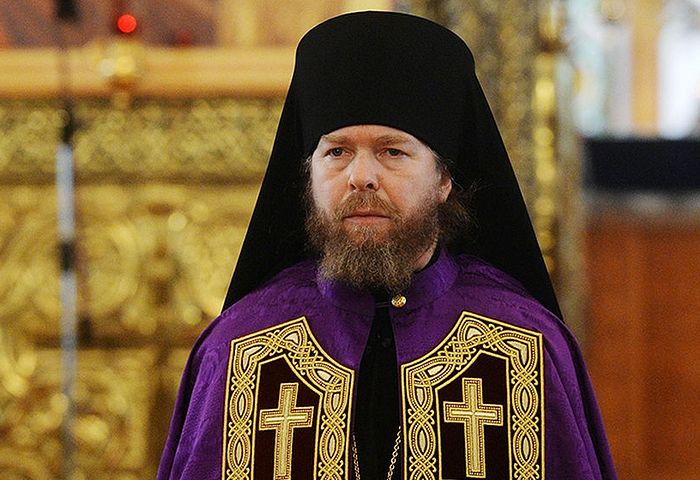
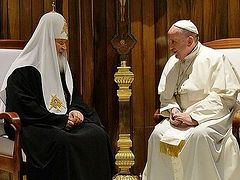
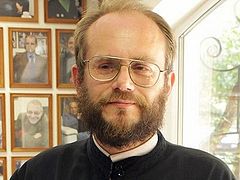
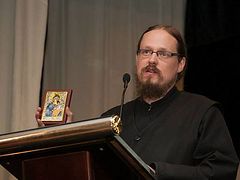
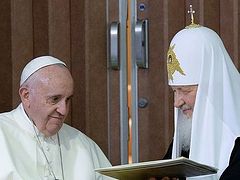
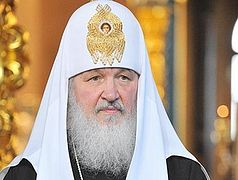
Master, bless!
Thank you for the most beautiful, powerful, and grace filled sermon. Glory to God!
I am only a simple parish priest in a small community in America. Yet, even here, I too am hearing from people complaining about the Patriarch's meeting and speaking against him and the meeting with judgement and condemnation. Lord have mercy.
I have just finished reading your sermon on this topic, and I am very blessed by your strong, clear, frank statements on the topic. I find it to be a great sermon simply taken as a sermon. More to the point, I find it a very powerful and clear and holy proclamation of the truth relating to this topic. I am going to spread your serrmon through the parish and do all I can to encourage everyone to read it.
I humbly ask for your prayers for me the sinner and offer my simple and unworthy ones for you and for your brotherhood, and remain
the unworthy priest Mark.
Serving at the parish of St. James the-brother-of-the-Lord Orthodox Church in Fort Collins, Colorado.